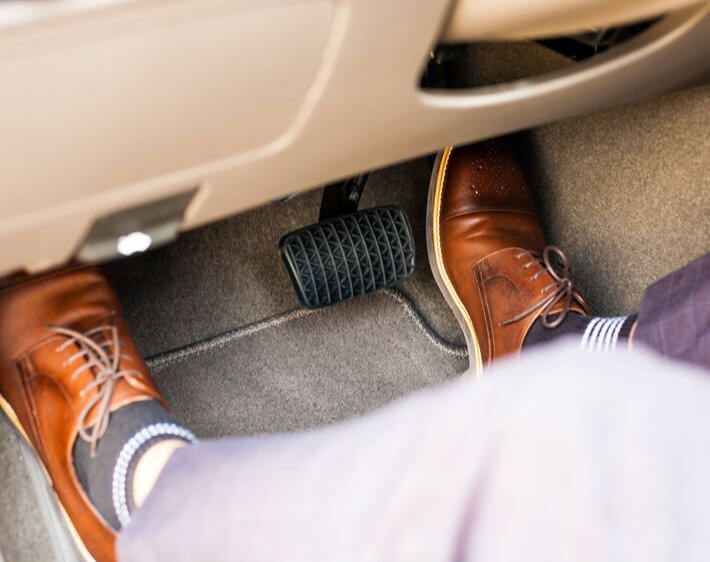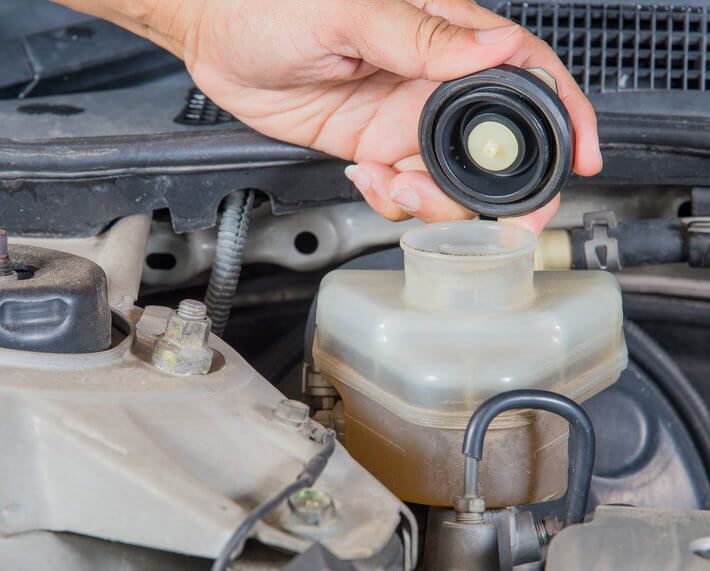On your mark, get set … stop?
Acceleration tends to get the most attention when it comes to cars, but great performance is about more than going fast. It's also about stopping quickly.
When you have a brake problem, bringing your car to a full stop can take more effort than it should. Spongy brakes—also described as squishy or mushy brakes—can cause big trouble if not addressed right away with a brake inspection and service. Find out what could be causing such a change in braking performance and how we can help solve it.
1. Air in the Brake Lines
Air in the brake lines is one of the most common causes of spongy brakes. Braking systems rely on evenly distributed hydraulic pressure to bring vehicles to a halt. Air in any of these lines can throw off this balance of pressure. Poor pressure can result in more time, distance, and/or effort to stop. In other words: a soft brake pedal. Air in the brake lines could be due to a leak or low brake fluid.
2. Brake Line Damage
What can damage a brake line and cause a leak? Rust, for one. Rust from road salt and moisture can cause brake lines to become brittle, leak, and break. Damage from a car crash can also cause brake lines to bend and collapse, weakening them and making them more susceptible to problems down the road.
3. Old or Low Brake Fluid
And how about low brake fluid? Time might be the key suspect here. Brake fluid converts the energy you apply to the brake pedal into the force required to bring your car to a stop. Just as your brake pads wear thin over time, so can your brake fluid.
As the brake pads wear and become thinner with use, the caliper piston moves further away from its housing, causing more brake fluid to be stored inside the caliper. This excess brake fluid can lead to low brake fluid in the master cylinder overtime with no signs of a leak.
If you can’t remember when you last had a brake service, then you might have low brake fluid simply because it’s being used by your braking system. Or, the low fluid could be due to a leak. Either way, it’s time to schedule a brake inspection!
4. Cylinder Wear
The master cylinder plays an important role in distributing the hydraulic pressure mentioned in #1. It pushes the brake fluid where it needs to be to help bring your car to a stop. Over time, seals within the cylinder can break or leak. If you have to press the brake pedal all the way to the floor to bring your vehicle to a stop, this might be why. The braking system simply isn’t working as efficiently as it used to.
5. Damaged Disc Brake Caliper
Braking creates a great deal of heat. That heat can damage your car’s disc brake calipers over time. How can you spot disc brake caliper damage? On top of spongy brakes, you may notice that your car pulls to one side or the other when stopping. You might also hear a squeaky or squealing sound when braking.
Stop brake problems before they stop you.
A braking system you can trust is a must-have for safe driving, regardless of the weather or road conditions. At Firestone Complete Auto Care, your safety is one of our top priorities and we’ll never recommend a service that doesn’t align with that priority. We offer free brake checks seven days a week, during which a qualified technician will measure brake system wear and check for leaks. Schedule an appointment online to have your spongy brakes inspected or stop by your nearest Firestone Complete Auto Care as soon as possible. Our technicians aren't "soft" on soft brakes!



